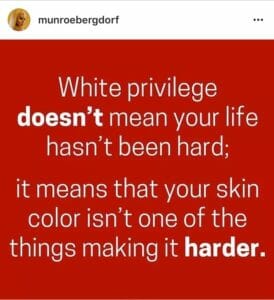What does “white privilege” actually mean?

I share with you the words of Lori Lakin Hutcherson. She can tell you her experiences as a middle-class, well-educated Black American. (I can tell no such story, since I have not lived it.)
I encourage you to read what she said. When you come back to my words, after reading her opinion piece, I highlight these points:
Why “be nice, be respectful” is not enough
Lori was responding to Jason, who was asking to be enlightened about this “White Privilege” he is accused of having. I give Lori a lot a credit. My blood was already boiling when I saw quotes around “White Privilege” and I read Jason’s tone as mocking. However, Lori knows him. She gave a real answer, as if it were a question asked in good faith. Brava!
Lori also answered the underlying discomfort that Jason expressed. He wanted enlightenment about why it not enough that he’s a respectful white guy.
In her response, she writes:
…I hope my experiences shed some light for you on how institutional and personal racism have affected the entire life of a friend of yours to whom you’ve only been respectful and kind. I hope what I’ve shared makes you realize it’s not just strangers, but people you know and care for who have suffered and are suffering because we are excluded from the privilege you have not to be judged, questioned, or assaulted in any way because of your race.
As she continues, she names a behavior, and requests a change in Jason’s behavior.
As to you “being part of the problem,” trust me, nobody is mad at you for being white. Nobody. Just like nobody should be mad at me for being black. Or female. Or whatever. But what IS being asked of you is to acknowledge that white privilege DOES exist and not only to treat people of races that differ from yours “with respect and humor,” but also to stand up for fair treatment and justice, not to let “jokes” or “off-color” comments by friends, co-workers, or family slide by without challenge, and to continually make an effort to put yourself in someone else’s shoes, so we may all cherish and respect our unique and special contributions to society as much as we do our common ground. [bolds are my edit–Rona]
Anti-Racism, for white people
 Since this Opinion piece was published in 2017, there remains a lack of awareness about white privilege.
Since this Opinion piece was published in 2017, there remains a lack of awareness about white privilege.
Let’s face it, white privilege is a hard term to swallow. People don’t want to be defined by the color of their skin (especially when being called out for a negative thing).
Privilege is easy to deny; there is always someone else who has more. That old sin, envy, is easy to awaken. Financially distressed white people don’t feel privileged.
The talking points, for white people:
- Bring forward the obstacles that Black people (and minorities) face. Lori’s experience held stumbling blocks due to her race, but she has succeeded. Her success does not erase the obstacles.
- In current times, there are people who do not feel safe on the streets, like Lori’s husband, because police are trained to profile them as criminals. Feeling safe around police is white privilege.
- Government officials are actively arresting people who are Latino. There have been native born Americans held because of mistaken identity, along with legal immigrants and undocumented ones. It is white privilege to not be concerned that the ICE raid will come to your workplace or your house.
- There is active violence against people in public places in America. This violence is aimed at non-white people, Muslims, Latinos, Jews, and LGBTQ people. There is a philosophy behind the drive towards this violence. That philosophy is based on maintaining white privilege.
If you want to understand the subtle undermining of the spirit that goes with being Black in America, Lori tells her story. It is full of overt meanness, polite prejudices, and moments of invisibility. If you don’t understand white privilege, it’s a good primer. Here’s that link, again.